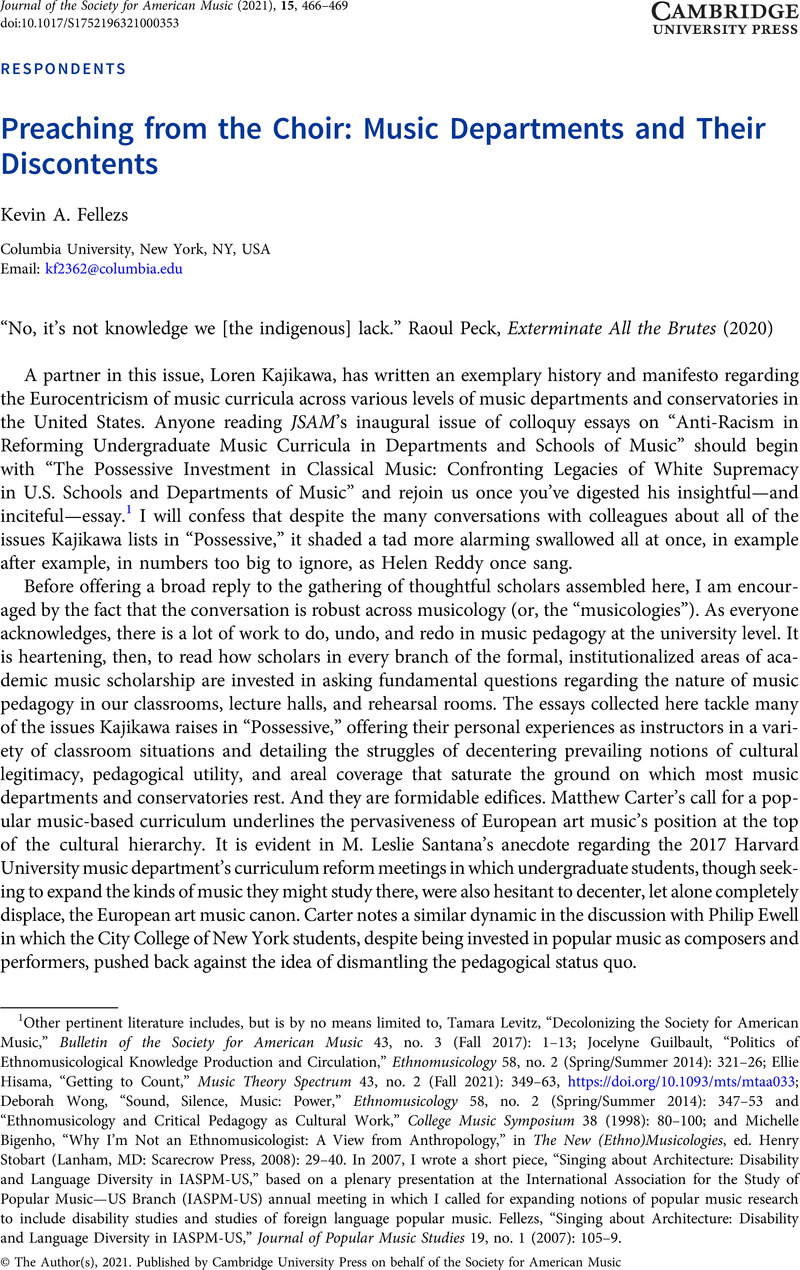No CrossRef data available.
Published online by Cambridge University Press: 22 December 2021

1 Other pertinent literature includes, but is by no means limited to, Levitz, Tamara, “Decolonizing the Society for American Music,” Bulletin of the Society for American Music 43, no. 3 (Fall 2017): 1–13Google Scholar; Guilbault, Jocelyne, “Politics of Ethnomusicological Knowledge Production and Circulation,” Ethnomusicology 58, no. 2 (Spring/Summer 2014): 321–26CrossRefGoogle Scholar; Hisama, Ellie, “Getting to Count,” Music Theory Spectrum 43, no. 2 (Fall 2021): 349–63CrossRefGoogle Scholar, https://doi.org/10.1093/mts/mtaa033; Deborah Wong, “Sound, Silence, Music: Power,” Ethnomusicology 58, no. 2 (Spring/Summer 2014): 347–53 and “Ethnomusicology and Critical Pedagogy as Cultural Work,” College Music Symposium 38 (1998): 80–100; and Bigenho, Michelle, “Why I'm Not an Ethnomusicologist: A View from Anthropology,” in The New (Ethno)Musicologies, ed. Stobart, Henry (Lanham, MD: Scarecrow Press, 2008): 29–40Google Scholar. In 2007, I wrote a short piece, “Singing about Architecture: Disability and Language Diversity in IASPM-US,” based on a plenary presentation at the International Association for the Study of Popular Music—US Branch (IASPM-US) annual meeting in which I called for expanding notions of popular music research to include disability studies and studies of foreign language popular music. Fellezs, “Singing about Architecture: Disability and Language Diversity in IASPM-US,” Journal of Popular Music Studies 19, no. 1 (2007): 105–9.
2 It is often at this point in a conversation with music colleagues with expertise in some aspect of the Western art music tradition that I often feel compelled to admit that I have an inordinate love of Baroque-era pipe organ music (whole trips have revolved around pipe organ recital schedules), Beethoven's piano pieces, Schubert's lieder, Grieg's cool Romanticism, and Webern's pointillistic compositions. On the other hand, I don't win any brownie points for preferring Steve Reich's early tape music to Milton Babbitt, opera buffa rather than opera seria, or for ranking Tchaikovsky over Mozart. That I feel the compulsion to perform an equivalent familiarity with classical music is part of the issue at hand. Let's be honest—there is no need to showcase one's popular music bona fides in most music departments. In formal academic settings, admitting that I would rather listen to reggae or heavy metal than any of the music I list above often diminishes, rather than enhances, any claims of musical expertise.
3 DiMaggio, Paul, “Cultural entrepreneurship in nineteenth-century Boston: the creation of an organizational base for high culture in America,” Media, Culture and Society 4, no. 1 (1982): 33–50Google Scholar.
4 Students in all of our program's areas—composition, ethnomusicology, historical musicology, music theory—must prove competency in two foreign languages even if they plan on conducting research that will only ever require reading and/or speaking competence in the English language.
5 Lorde, Audre, “The Master's Tools Will Never Dismantle the Master's House,” in Sister Outsider: Essays and Speeches (Berkeley: Crossing Press, 2007 [1984]): 110–113Google Scholar.